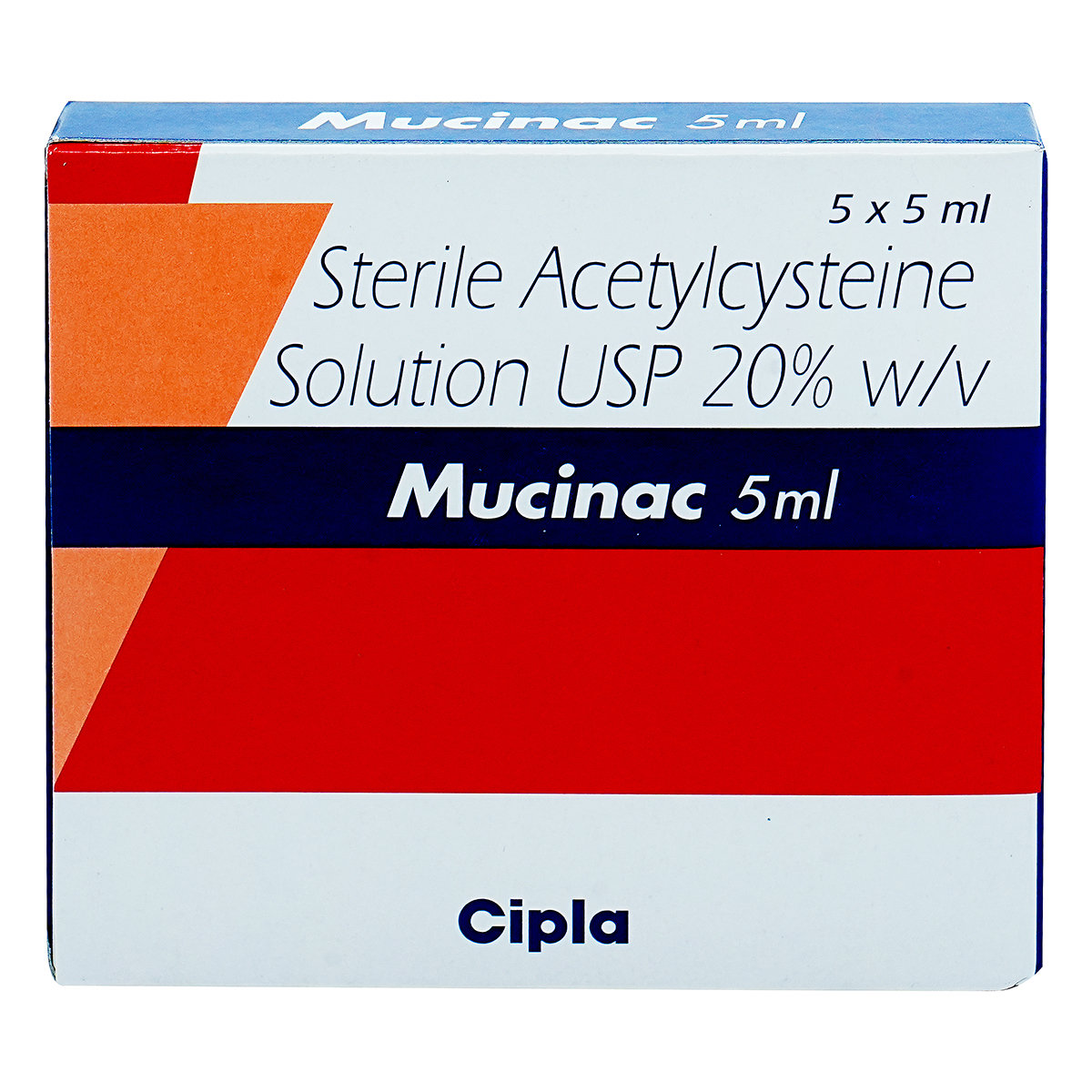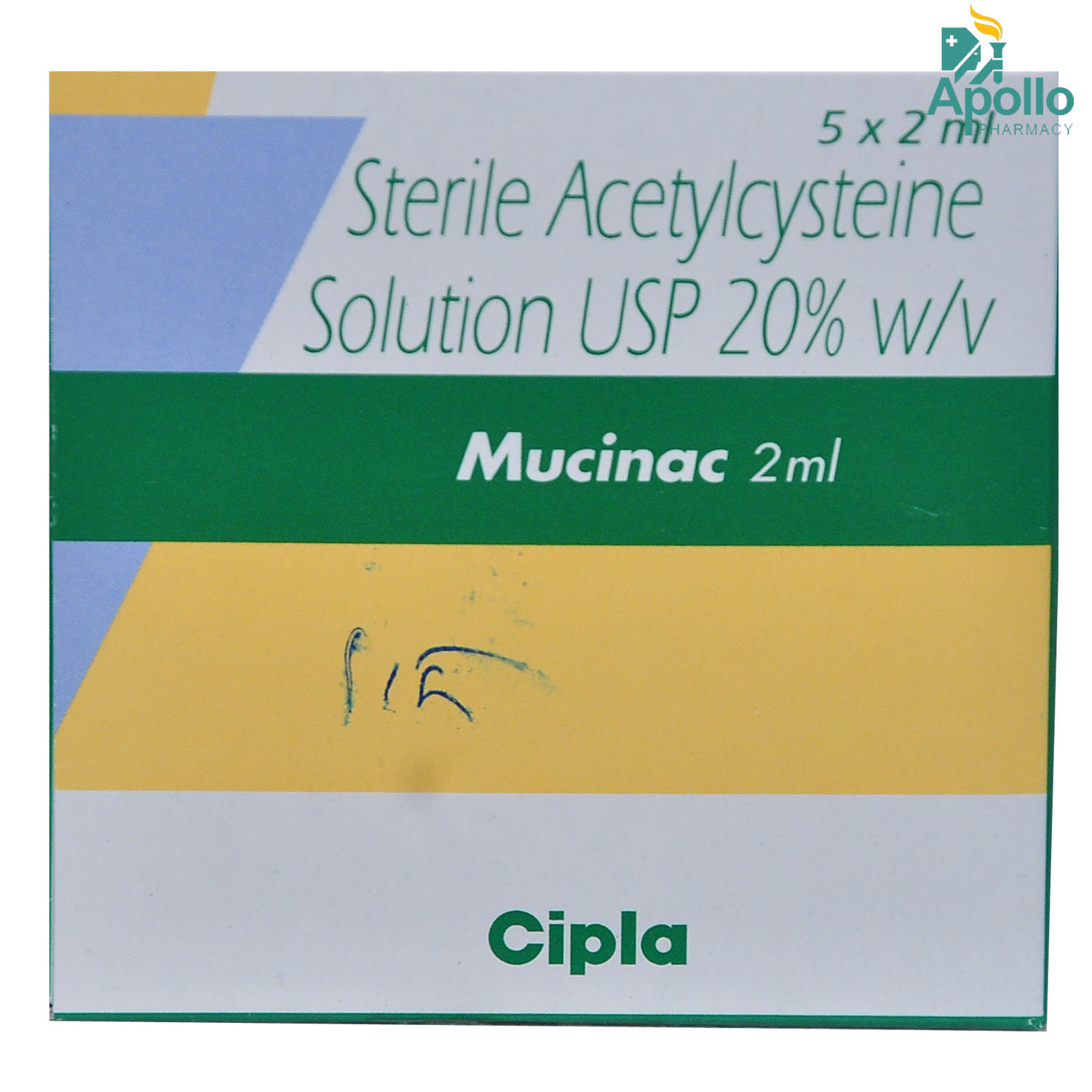Acetaclor Injection
MRP ₹50.1
(Inclusive of all Taxes)
₹7.5 Cashback (15%)
Provide Delivery Location
Online payment accepted
 Prescription drug
Prescription drugWhats That
About Acetaclor Injection
Acetaclor Injection belongs to a class of drugs called antidotes used to treat Paracetamol (acetaminophen) overdose and prevent liver injury. Paracetamol overdose may occur when the person takes more than 8 Paracetamol tablets in 24 hours accidentally or when intended to cause self-harm. If it is not treated promptly with an antidote, significant overdose can lead to liver failure.
Acetaclor Injection contains Acetylcysteine that works by restoring the levels of glutathione, a chemical that eliminates toxic substances.
Acetaclor Injection will be administered by a healthcare professional; do not self-administer. Some people may experience inflammation and pain at the injection site, nausea, vomiting, fever, excessive shivering, sweating, bruising, or bleeding more easily than normal. Most of these side effects of Acetaclor Injection do not require medical attention and gradually resolve over time. However, if the side effects persist or worsen, please consult your doctor.
If you are allergic to Acetaclor Injection or any other medicines, please tell your doctor. Acetaclor Injection is given to children in doses advised by a doctor based on the child’s age and weight. If you are pregnant or breastfeeding, please inform your doctor before taking Acetaclor Injection. If you are about to undergo any surgery, inform the anaesthetist or surgeon that you are being treated with Acetaclor Injection.
Uses of Acetaclor Injection
Directions for Use
Key Benefits
Acetaclor Injection is an antidote for Paracetamol (acetaminophen) overdose. It works by restoring the body’s glutathione, a chemical that eliminates toxic substances. Also, it protects the liver from damage caused due to high levels of paracetamol. Acetaclor Injection is very effective when given within 10 hours of paracetamol overdose.
Storage
- Contact your doctor immediately if you're experiencing a fast heart rate, palpitations, or other heart-related symptoms. This is crucial to determine whether the symptoms are related to your medication.
- Your doctor may need to adjust your medication regimen to alleviate the fast heart rate symptoms. This could involve changing the medication, reducing the dosage, or adding new medications to counteract the side effects.
- Follow your doctor's advice on monitoring your heart rate and blood pressure. This will help track any changes and ensure your heart rate returns normal.
- If you experience severe symptoms such as chest pain, dizziness, or shortness of breath, seek immediate medical attention. These symptoms can indicate a more serious condition that requires prompt treatment.
- Inform your doctor about the nausea and discuss possible alternatives to the medication or adjustments to the dosage.
- Divide your daily food intake into smaller, more frequent meals to reduce nausea.
- Opt for bland, easily digestible foods like crackers, toast, plain rice, bananas, and applesauce.
- Avoid certain foods that can trigger nausea, such as fatty, greasy, spicy, and smelly foods.
- Drink plenty of fluids, such as water, clear broth, or electrolyte-rich beverages like coconut water or sports drinks.
- Use ginger (tea, ale, or candies) to help relieve nausea.
- Get adequate rest and also avoid strenuous activities that can worsen nausea.
- Talk to your doctor about taking anti-nausea medication if your nausea is severe.
- Record when your nausea occurs, what triggers it, and what provides relief to help you identify patterns and manage your symptoms more effectively.
- Preventing Vomiting (Before it Happens)
- Take medication exactly as prescribed by your doctor. This can help minimize side effects, including vomiting.
- Having a small meal before taking your medication can help reduce nausea and vomiting.
- Talk to your doctor about taking anti-nausea medication along with your prescribed medication.
- Managing Vomiting (If it Happens)
- Try taking ginger in the form of tea, ale, or candy to help alleviate nausea and vomiting.
- What to Do if Vomiting Persists
- Consult your doctor if vomiting continues or worsens, consult the doctor for guidance on adjusting your medication or additional treatment.
- Wear loose-fitting clothes and breathable fabrics.
- Keep your room cool by using a fan or AC.
- Avoid or limit spicy food, alcohol and caffeine as they can trigger hot flashes.
- Manage stress by practising relaxation techniques with yoga and meditation.
- Quit smoking.
- Maintain a healthy weight by including fruits and vegetables in your diet.
- Consult your doctor if you experience skin redness, itching, or irritation after taking medication.
- Your doctor may adjust your treatment plan by changing your medication or providing guidance on managing your erythema symptoms.
- Your doctor may recommend or prescribe certain medications to help alleviate symptoms.
- Apply cool compresses or calamine lotion to the affected skin area to reduce redness and itching.
- Stay hydrated by drinking plenty of water to help alleviate symptoms and keep your skin hydrated.
- Monitor your skin condition closely and promptly report any changes, worsening symptoms, or concerns to your healthcare provider.
- Tell your doctor about the cough symptoms you're experiencing, which may be triggered by your medication.
- Your doctor may adjust your treatment plan by changing your medication, adding new medications, or providing guidance on managing your cough symptoms.
- Practice good hygiene, including frequent handwashing, avoiding close contact with others, and avoiding sharing utensils or personal items.
- Stay hydrated by drinking plenty of fluids, such as water, tea, or soup, to help thin out mucus and soothe your throat.
- Get plenty of rest and engage in stress-reducing activities to help your body recover. If your cough persists or worsens, consult your doctor for further guidance.
Drug Warnings
If you are allergic to Acetaclor Injection or any other medicines, please tell your doctor. Acetaclor Injection is given to children in doses advised by a doctor based on the child’s age and weight. If you are pregnant or breastfeeding, please inform your doctor before taking Acetaclor Injection. If you are about to undergo any surgery, inform the anaesthetist or surgeon/dentist that you are being treated with Acetaclor Injection. If you have a history of stomach ulcers or have asthma, inform your doctor before taking Acetaclor Injection.
Drug-Drug Interactions
Drug-Drug Interactions
Login/Sign Up
Drug-Food Interactions
Drug-Food Interactions
Login/Sign Up
Diet & Lifestyle Advise
- Do not take more than the Paracetamol dose mentioned on the label or prescribed by the doctor.
- Avoid giving Paracetamol to your child unless it is necessary for their fever or pain.
- For children below 2 years, use Paracetamol only in the dose advised by the doctor based on the child’s body weight.
- Limit or avoid alcohol consumption.
Side Effects of Acetaclor Injection
- Inflammation and pain at the injection site
- Nausea
- Vomiting
- Fever
- Excessive shivering
- Sweating
- Bruising or bleeding more easily than normal
Habit Forming
Therapeutic Class
All Substitutes & Brand Comparisons
RX
Mucinac Injection 5 ml
Cipla Ltd
₹124
(₹21.82/ 1ml)
3% CHEAPERRX
Mucotroy Injection 5 ml
Troikaa Pharmaceuticals Ltd
₹123.5
(₹22.24/ 1ml)
1% CHEAPERRX
Helios Bronac-20% Injection 5ml
Healers Pharmaceuticals Pvt Ltd
₹124
(₹22.32/ 1ml)
1% CHEAPER
Author Details
We provide you with authentic, trustworthy and relevant information
Drug-Diseases Interactions
Drug-Diseases Interactions
Login/Sign Up
For individuals who have encephalopathy brought on by hepatic failure, the use of Acetaclor Injection should be stopped in order to prevent further nitrogenous material ingestion.
How to manage the interaction:
Acetaclor Injection should be discontinued in patients with encephalopathy (permanent or temporary brain damage) due to liver failure.
When treating asthmatic patients or situations where bronchospasm has occurred in the past, Acetaclor Injection should be administered cautiously. When starting and continuing Acetaclor Injection medication, patients with asthma should be closely monitored.
How to manage the interaction:
Acetaclor Injection should be used with caution in asthma patients or where there is a history of bronchospasm (tightening of muscles lining airways). Asthma patients should be closely monitored during the initiation of and throughout Acetaclor Injection therapy.
Acetaclor Injection administered intravenously may lead to fluid overload, which may result in hyponatremia, seizures, and even death.
How to manage the interaction:
To avoid fluid overload, a diluted dose is recommended, especially in patients less than 40 kg and those requiring fluid restrictions.
Acetaclor Injection use may make vomiting worse. The risk of gastrointestinal haemorrhage should be assessed in patients with peptic ulcer disease.
How to manage the interaction:
Patients with peptic ulcer disease should be evaluated for the risk of gastrointestinal bleeding. In case of gastric haemorrhage, Acetaclor Injection is advised if your doctor considers benefit for you is greater than risk.
FAQs
Special Advise
Acetaclor Injection may give a false positive result with reagent dipstick tests for urinary ketones. Therefore, inform the lab technician that you are taking Acetaclor Injection before undergoing any laboratory tests.
Disease/Condition Glossary
Paracetamol overdose: It may occur when the person takes more than 8 Paracetamol tablets in 24 hours accidentally or when intended to cause self-harm. If it is not treated promptly with an antidote, significant overdose can lead to liver failure. The symptoms of Paracetamol overdose include vomiting and nausea after a few hours of taking an overdose, and after 24 hours, there may be jaundice (yellowing of the whites of skin and eyes) and pain under the ribs on the right side. Also, it may cause hypoglycemia (low blood sugar) and loss of appetite.

Have a query?
Alcohol
Safe if prescribed
Interaction of alcohol with Acetaclor Injection is unknown. Please consult a doctor before consuming alcohol with Acetaclor Injection.
Pregnancy
Consult your doctor
Acetaclor Injection is given to pregnant women only if the doctor thinks the benefits outweigh the risks.
Breast Feeding
Consult your doctor
Acetaclor Injection is given to breastfeeding mothers only if the doctor thinks the benefits are greater than the risks.
Driving
Safe if prescribed
Acetaclor Injection usually does not affect your ability to drive or operate machinery.
Liver
Consult your doctor
Acetaclor Injection should be used with caution if you have a history of Liver diseases/conditions. Your doctor will decide to administer Acetaclor Injection if the benefits are greater than the risks.
Kidney
Consult your doctor
Acetaclor Injection should be used with caution if you have a history of Kidney diseases/conditions. Your doctor will decide to administer Acetaclor Injection if the benefits are greater than the risks.
Children
Safe if prescribed
Acetaclor Injection is given to children in doses advised by a doctor based on child’s age and weight.









_0.jpg?tr=q-85)
